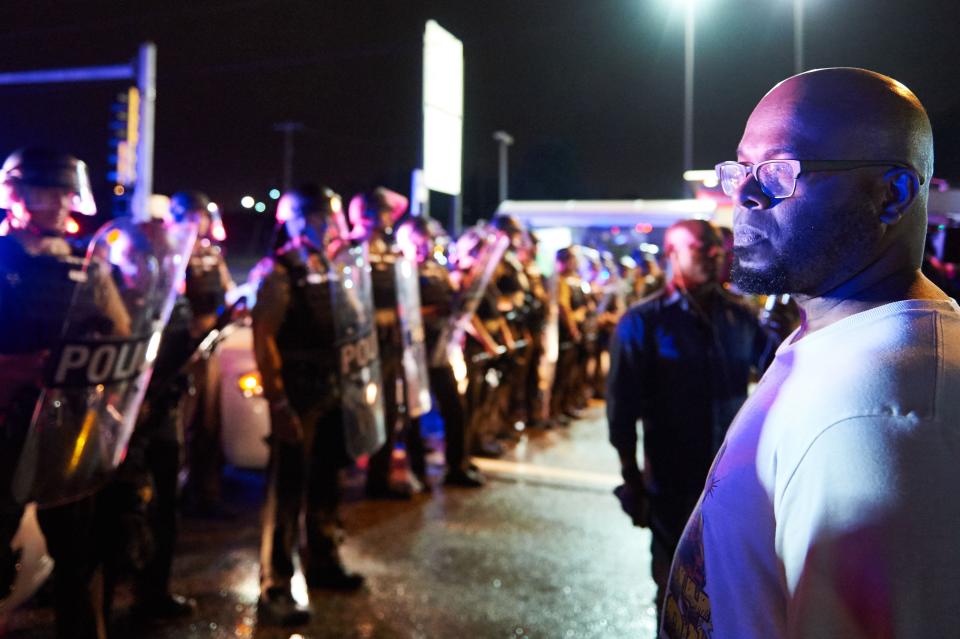Five years after Brown's death and Ferguson protests, America must commit to doing better
In 1992, long before the death of black teen Michael Brown at the hands of a white cop in Ferguson, Missouri, civil rights leader and Supreme Court Justice Thurgood Marshall captured the sense of urgency needed to solve the problems of racism in America.
“I wish I could say that racism and prejudice were only distant memories. ... We must dissent from the indifference. We must dissent from the apathy. We must dissent from the fear, the hatred and the mistrust,” Marshall said.
I still carry his words with me as I think about the deaths of hundreds of young black men at the hands of police. Five years ago today, just a couple of days before he was to start college, Brown, who was unarmed, became one of them — killed by a cop on the streets of a St. Louis suburb.
Had he survived, Brown would now be 23, with most of his life still ahead of him. Instead, he has become another powerful symbol that black people in America live under a different set of rules.
Brown’s death, like the countless that came before and the more than 1,000 that have happened since, is part of America’s legacy of senseless, unjustified deaths of black people at the hands of law enforcement.
The profound sense of sadness over these losses is compounded by the inevitable lack of punishment for those who took their lives. It’s as predictable as it is heartbreaking.
The officer who killed Brown served no jail time. We continue to see that, when given the opportunity to hold police responsible, our justice system falls short.
The latest example is the federal government’s announcement last month that it would not bring charges against the New York City police officer who fatally choked unarmed black man Eric Garner in 2014. In a cruel twist, the Department of Justice waited until the day before the statute of limitations expired to tell us something we knew years ago — they were never serious about justice.
As he lay dying, Garner cried out, “I can’t breathe. I can’t breathe.” His dying words became a rallying cry for black Americans — tired, scared, but most of all outraged at the latest chapter in a shameful history of racism in America.
From the White House to police departments across the country, we see an unmistakable willingness to treat African Americans differently from white people. We’re more likely to be stopped by police and more likely to experience force at the hands of police. We’re also more likely to be shot and killed by police.

Black Americans are 13.4% of the U.S. population — but we make up 24% of police shooting deaths. Something doesn’t add up.
To solve a problem, we first need to acknowledge it. With that in mind, I do see signs of hope.
Since Brown’s death, police departments across the country have adopted the use of body cameras. That’s a significant step toward establishing the transparency crucial to building trust in law enforcement.
Even so, there is still work to do.
In some cases, video footage ceases to be an instrument of transparency and instead becomes another agent of oppression when its release is delayed and when officers suspected of using excessive force are allowed to review footage before submitting their statements on incidents under investigation. Video footage can lead to transparency, but it can also be used selectively — as I’ve seen happen too many times.
I see signs of hope in the increasing number of black prosecutors throughout the country. But many of them face obstacles, legal and otherwise, that their white counterparts do not.
Yes, the number of blacks shot and killed by police across the country is discouraging, but the memories of Brown, Garner and every other person lost must not be a yoke upon our efforts.
They must be a spur.
I find hope in the undeniable desire of those people not just saddened by Brown’s loss but also emboldened by it to take positive action. When Brown died, only one of Ferguson’s six city council members was black. Today four of them are.
I find hope in the people who, instead of leaving or avoiding Ferguson and its challenges, have dug in and worked to make change.
On the site of the QuikTrip convenience store that became the epicenter of protests after Brown’s death, there is now a 13,000-square-foot community center. The Boys & Girls Club is set to build a new facility, too.
Marshall’s words about defeating racism are as right now as they were nearly 30 years ago.
“We must dissent," he said during that 1992 speech, "because America can do better, because America has no choice but to do better.”
We must, and I believe we will.
Ben Crump is a nationally known civil rights attorney and advocate.
This article originally appeared on USA TODAY: Five years after Ferguson protests, America must do better

